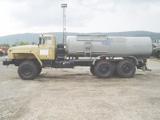|
|
TODAY.AZ / Business
Oil at $75 a barrel makes BTC a fast success
13 July 2006 [11:01] - TODAY.AZ

Almost 10 years ago, then-President Bill Clinton threw his weight behind a multibillion-dollar pipeline designed to bring the oil riches of the Caspian Sea to the West, bypassing Russia and tapping a source of crude outside the unstable Middle East.
Critics derided the proposed 1,100-mile, $3.9 billion pipeline - snaking through Azerbaijan, the mountains of Georgia and northern Turkey before hitting the Mediterranean coast - as too expensive and too difficult to build.
Today, the leaders of those three nations will gather at the port of Ceyhan to formally inaugurate the pipeline. With oil near $75 a barrel - triple the price when Clinton was president - and Iran harboring nuclear ambitions, the once controversial project looks far more attractive.
"No one would have thought that when oil reached Ceyhan it would be $75 a barrel," said Suat Kiniklioglu, the director of the German Marshall Fund of the United States' Ankara office. "It's a huge success."
The pipeline was part of a U.S. strategy to diversify the sources and flow of oil imports, cutting the risk to consumers that any shock would affect oil supplies, sending prices higher, the Associated Press reports.
It began pumping late last month, and about 430,000 barrels of oil are flowing each day, said Norman Rodda, the construction manager for the Turkish section of the pipeline.
That might be only a fraction of the 85 million barrels a day that the world consumes, but with global production stretched and prices skyrocketing, "all supplies matter," said David Knapp, a senior editor for global oil-market analysis at Energy Intelligence group in New York.
"Additional oil coming into the Mediterranean market helps soften the increase in prices," he said. "It hasn't had a major impact yet, but it is possible that prices would have been higher if that oil was not on the market."
Officials at oil company BP PLC, the pipeline consortium's main participant and the largest foreign investor in Azerbaijan's oil sector, said they expect pumping to increase to 1 million barrels a day by 2008.
Kazakhstan recently said it would begin pumping some oil through the pipeline, and Azeri production is expected to be increased to reach that goal.
There is also talk of building pipelines across Turkey that would bring Russian oil and natural gas to European markets and of another pipeline across Bulgaria and Greece that would allow Russian oil exports to bypass the crowded Bosporus, the strait that cuts across Istanbul.
With most of the oil destined for European markets, Turks are hopeful that the pipeline will expand their influence in Europe as they press for European Union membership.
Oil from Iraq is exported from the same port, but that flow has repeatedly been disrupted by insurgent attacks.
/www.journalnow.com/
URL: http://www.today.az/news/business/28129.html
 Print version
Print version
Connect with us. Get latest news and updates.
See Also
- 31 October 2025 [12:35]
EU names Azerbaijan strategic partner in Middle Corridor initiative - 30 October 2025 [12:58]
Azerbaijan, Türkiye sign MoU to strengthen cooperation in insurance sector - 30 October 2025 [12:02]
Azerbaijan and OECD discuss prospects for enhanced cooperation - 29 October 2025 [15:29]
Locations for new energy storage systems revealed in Azerbaijan - 29 October 2025 [15:04]
Azerbaijan strengthens green financing framework for renewable energy projects, says official - 29 October 2025 [14:52]
EBRD supports Azerbaijan in developing national hydrogen energy roadmap - 29 October 2025 [11:43]
Azerbaijan, Xi’an discuss prospects for direct flights and cooperation in transport - 29 October 2025 [10:00]
Azeri Light price declines - 28 October 2025 [17:36]
World Bank urges Azerbaijan to accelerate reforms to attract private investment - 28 October 2025 [10:21]
Azerbaijan strengthens position among Turkiye’s top three natural gas suppliers in 2025
Most Popular
 Pakistan closes airspace along border amid India’s large-scale military drills
Pakistan closes airspace along border amid India’s large-scale military drills
 Azerbaijani Foreign Minister meets Omani counterpart to boost bilateral cooperation
Azerbaijani Foreign Minister meets Omani counterpart to boost bilateral cooperation
 World Bank urges Azerbaijan to accelerate reforms to attract private investment
World Bank urges Azerbaijan to accelerate reforms to attract private investment
 Azerbaijan, Oman discuss deepening partnership during official talks
Azerbaijan, Oman discuss deepening partnership during official talks
 BIG to host first international conference on Belgian colonialism
BIG to host first international conference on Belgian colonialism
 Turkiye to host 1st Forum of Azerbaijani Cultural Ambassadors
Turkiye to host 1st Forum of Azerbaijani Cultural Ambassadors
 Pakistan-Afghanistan talks ended without results in Istanbul
Pakistan-Afghanistan talks ended without results in Istanbul
